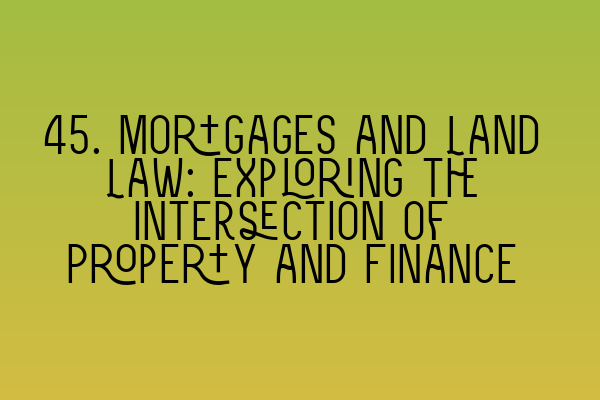45. Mortgages and Land Law: Exploring the Intersection of Property and Finance
Welcome to another insightful blog post from SQE Property Law & Land Law! In this article, we will journey into the fascinating world where property law meets finance – mortgages and land law. This intersection forms the backbone of real estate transactions, making it an essential area of study for aspiring solicitors.
Before we delve deeper, if you are preparing for the SQE exam, we recommend checking out our related articles on SQE 1 Practice Exam Questions and SQE 1 Practice Mocks FLK1 FLK2. Additionally, if you are looking for comprehensive preparation courses, do explore our offerings for SQE 2 and SQE 1. Stay up to date with the latest SRA SQE Exam Dates as well.
Now, let’s dive into the intriguing world of mortgages and land law!
1. What is a Mortgage?
A mortgage is a legal agreement between a borrower and a lender, typically a financial institution such as a bank. It allows the borrower to secure a loan by providing the lender with a legal interest in their property. This creates a form of security for the lender in case the borrower defaults on the loan.
2. Creation of a Mortgage
The creation of a mortgage involves two key documents – the mortgage deed and the charge certificate. The mortgage deed outlines the terms of the agreement, including the amount borrowed, the interest rate, and the repayment schedule. The charge certificate is then registered with the Land Registry to officially create the mortgage.
3. Equitable Mortgages
In addition to legal mortgages, there are also equitable mortgages. These arise when the borrower gives the lender an equitable interest in the property, even without formal registration. Equitable mortgages can be created through an exchange of deeds or by demonstrating an intention to create a security interest.
4. Priority of Mortgages
When multiple mortgages exist on a single property, disputes may arise regarding their priority. The general rule is that the first registered mortgage takes priority over subsequent mortgages. However, there are exceptions to this rule, such as overriding interests and equitable principles.
5. Discharge and Redemption of Mortgages
Once the borrower repays the loan in full, the mortgage can be discharged. Discharging a mortgage involves obtaining a certificate of satisfaction or a release of the charge. At this point, the borrower recovers full ownership of the property, free from any encumbrances.
6. Foreclosure and Repossession
In the unfortunate event that a borrower defaults on their mortgage payments, the lender may initiate foreclosure proceedings. Foreclosure involves seizing the property and selling it to recover the outstanding debt. This drastic measure should only be utilized as a last resort.
7. Mortgages and Leasehold Properties
Mortgages also play a crucial role in the realm of leasehold properties. Leasehold mortgages involve additional complexities, such as obtaining consent from the landlord and ensuring compliance with lease terms. Solicitors specializing in leasehold transactions must navigate these intricacies to protect their clients’ interests.
Closing Thoughts
The connection between mortgages and land law is undeniable. Aspiring solicitors must possess a deep understanding of this intersection to provide effective legal advice to clients involved in real estate transactions. By comprehending the intricacies of mortgages and their impact on property rights, solicitors can navigate the complexities of property finance with confidence.
We hope this article has shed light on the fascinating world of mortgages and land law. If you found this information helpful, we encourage you to explore our comprehensive SQE preparation courses for both SQE 1 and SQE 2. Be sure to check out our related articles on SQE exam practice and keep up to date with the latest SRA SQE Exam Dates.
Stay tuned for more informative articles from SQE Property Law & Land Law. Remember, knowledge is power in the legal profession!
